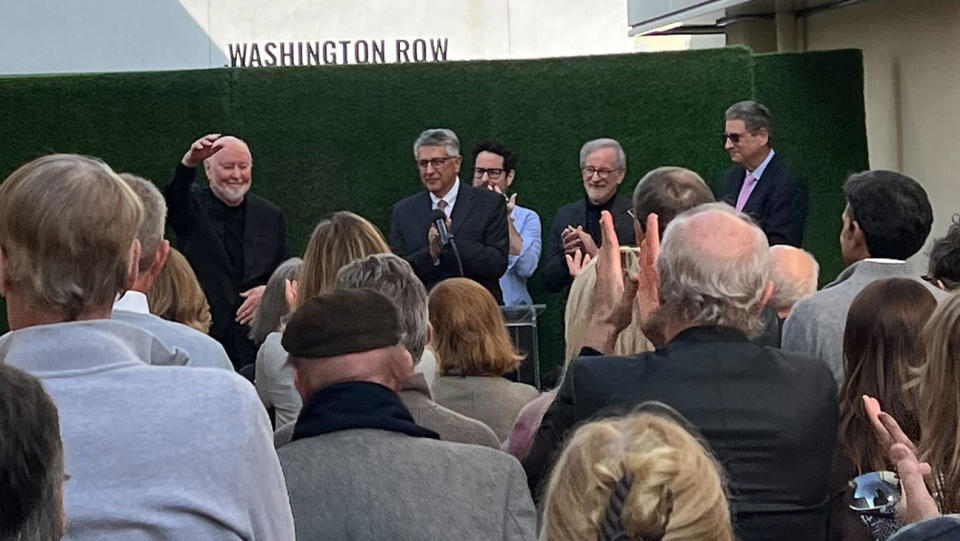Sony Renames Music Building After John Williams as Hollywood Legends Turn Out to Pay Tribute

On Thursday afternoon, the history-filled Sony lot in Culver City — which was the MGM lot during Hollywood’s Golden Age, home to “more stars than there are in heaven” — welcomed film composer John Williams, after whom the studio’s musical building was being renamed.
Williams, 91, who is best known for the scores of Star Wars and 29 Steven Spielberg films — 20 of which were scored in the structure that will henceforth be known as the John Williams Music Building — was on hand, as were many of his collaborators (Spielberg, J.J. Abrams and Spielberg’s producers Frank Marshall and Kristie Macosko Krieger) and colleagues (including fellow film composer Thomas Newman).
More from The Hollywood Reporter
Sony Pictures Entertainment chairman and CEO Tony Vinciquerra kicked off the festivities by noting how much “magic was made right here in this building.” Sony Pictures Entertainment Motion Picture Group chairman and CEO Tom Rothman then argued that the greatest of all time in many fields is debatable, citing the examples of Michael Jordan vs. LeBron James, Jack Nicklaus vs. Tiger Woods, Claude Monet vs. Vincent van Gogh and Stanley Kubrick vs. Spielberg — but that when it comes to film scoring, “There is no argument: John Williams is the GOAT,” adding, “I’m very sure that 100 years from now the name that will go on this building today will still be the name of the greatest of all time.”
Abrams spoke next, addressing Williams, “Johnny, you’ve filled our lives with some of the greatest art ever produced by humankind,” and the other attendees: “How lucky are we to be alive at the same time as John Williams?”

Then it was Spielberg’s turn. “Johnny, I have grown up with you,” the filmmaker said, recalling how struck he had been listening to the album of Williams’ score for the 1969 film The Reivers, vowing, “If I ever got the chance to make a movie, I would want the guy who wrote this.” The two met ahead of Spielberg’s feature directorial debut, 1974’s The Sugarland Express, and have rarely worked apart since.
“It was the beginning of a beautiful friendship,” Spielberg said, before turning to Williams: “What you did for me was something I had never been able to imagine any single creative collaborator would ever be able to do for me or the stories I was telling, and that is when I thought I’d gotten to know a film really well, by the time I turned my films over to you, I knew what my movies were, I knew what they meant to me. Then you would musically do the final draft of my films, the final rewrite, and you would bring every movie I’ve ever made to a level that I didn’t recognize it as me, I recognized it as us. The films suddenly became informed by wherever you get your inspiration… Without you, the films are running around with no clothes on; with you, they’re completely finished. I’ve often said that if my movies can bring a tear to your eye, your music makes that tear fall down the face. And it’s happened on film after film after film. This alley is where all my stress dissipates, when I finally get to this stage of a production and I know that I am in your capable hands.”
Spielberg then invited the prior speakers and Williams to the stage, took a conductor’s baton and motioned towards a sheet-covered portion of the building, and upon his cue the sheet lifted and the new name of the building was visible.
Williams then stepped up to the podium and cracked, “This is the alley where Steven destresses. This is the alley is where I stress!” He then shared that his history at the building that now bears his name dates back long before his professional career: “The first time I came to this studio was 1940 when my father brought me here to show me the stage. I was about 9 or 10 years old, and I thought [he joked], ‘Someday this will all be mine!’ It’s finally come to be — it’s only taken me 92 years to get here! [His 92nd birthday is on Feb. 8.]” He added with a chuckle, “This place, I have reverence for it. I love it. Is it perfect? No. Tom, we could use a couple more bathrooms for the orchestra.”

Williams closed by asserting, “My hope and even prayer for this hall and for future people coming into it is a hope and it’s also a challenge: that they should do as well the next 100 years as the people who have been here for the last 100 years. They need to get to work and make some good music. And that is a challenge because they are standing on very big shoulders.”
As guests posed for photographs and headed over to a buffet lunch, Rothman escorted a fellow journalist and I into the John Williams Music Building, where another great composer, Oscar winner Dario Marianelli, was scoring, with a full orchestra, the upcoming Ghostbusters: Frozen Empire, as director Gil Kenan looked on. Rothman notified them, during their session, that the name of their building had changed.
Best of The Hollywood Reporter

 Yahoo News
Yahoo News 
